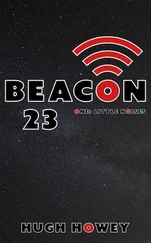“Scrabble tonight, huh? Well, I hope she goes easy on you, old fellow.”
Daniel smiled at the reference to his progressing age. It was kind of him to notice, to nurse along the ruse. “She never goes easy on me,” he replied in mock sadness.
Charles added the tray of half-eaten food to his cart and sorted some paper cups full of pills. “Would you mind delivering her medication for me? You know how Mrs. Reynolds feels about…” The android paused and looked at his feet. “…my kind,” he finished.
Daniel nodded. “She’s getting worse, isn’t she? About treating you, I mean?”
Charles strolled over to deliver the medication. “It’s fine. Like I always tell you, she’s done enough for my kind that I’ll stomach a little—unkindness.”
The nurse-bot turned back to his cart.
“Either way, I’m sorry,” Daniel called after him.
Charles stopped. Spun around. “You ever hear of a woman named Norma Leah McCorvey?” he asked.
Daniel leaned back on the wall so his bad leg wouldn’t drain his batteries. “Didn’t she pass away? She lived two halls over, right? The woman with—”
“No, no. That was Norma Robinson. Yeah, she passed away in ’32. Norma McCorvey lived, oh, over a hundred years ago. She was more famously known as Jane Roe.”
Daniel knew that name. “ Roe v. Wade, ” he said.
“That’s right. One of the biggest decisions before your wife came along…” The nurse-bot studied his shoes again. “And people remember her for that—for the decision. They remember her as Roe, not as McCorvey.”
“I don’t follow,” Daniel told Charles. He eyed his wife’s door and fought the urge to be rude.
“Well, most people don’t know, but years later—Norma regretted her part in history. Wished she’d never done it. Converted to one of the major religions of her day and fought against the progress she’d fostered. I just…” He looked back up. “I’ll always remember you and your wife for the right reasons, is all.” He turned to his cart without another word and started down the hall.
Daniel watched him go. One of the cart’s wheels spun in place; he wondered when Charles would finally get around to fixing that. Favoring his bad leg, he shuffled across the hall to Melanie’s door. It was shut tight, as usual. He knocked twice, just to be polite, before pushing it open. A familiar lump stirred on the bed, changing shape like a dune in a heavy gale.
“Who’s there?” a raspy voice croaked.
Daniel went to the sink and poured a cup of water. “It’s me. Daniel. Your husband.”
She rolled over, long white hair falling back to reveal a thin, weathered face. Wispy brows arched up in a look of surprise that had become her state of rest. “Daniel? Dear? When did you get here?”
“I live across the hallway, sweetheart.” He said it patiently as he crossed to her with the two cups.
“Of course. That’s right,” she said. “Why do I keep forgetting that?”
“Don’t worry. I forget stuff all the time. Here. Take these.”
Melanie labored to sit up straight, grunting with the effort.
“Honey, use the remote. Let me show you…” Daniel reached for the bed controls, but his wife waved a fragile arm at him, shooing his words away.
“I don’t trust the thing. And I don’t trust whatever that damned robot is wanting me to swallow.”
Daniel sat on the edge of the bed and held the first cup out to her. “He just delivers what Dr. Mackintosh prescribes, dear. Don’t take it out on the messenger. Now, swallow these; they’ll make you feel better.”
She shot him a look as she threw the pills on her tongue. “I don’t wanna feel better,” she spat around them.
“Well, I want you to. Now drink.”
She did.
He set the paper cups aside and smiled at her, trying to help her forget her bad mood. “Do you feel like a game of Scrabble?” he asked. Thirty years as a lawyer, winning rights for his kind, had filled her head with a vocabulary that computers were envious of. Even though she couldn’t string them together into rational ideas—not anymore—the words were still there, ready to be pulled from confounding racks with too many consonants.
“Scrabble night?” Her eyes flashed beneath the webs of cataracts. “You mean ‘Bingo Night,’ right?” False teeth flashed with the joke, a reference to her rack-clearing skills with seven- and eight-letter words.
“You call it what you want, but Charles said you should go easy on me tonight.”
“Fuck Charles. You tell that abomination—” Melanie stopped, her eyes widened even further. “Sweetheart, what did you do to your forehead?”
Daniel moved a hand up to his brow; it came away spotted pink, the drippings of a future scar. Too many primes, he thought.
“I must’ve hit it on something,” he lied. “You know how clumsy I can be.” He turned to the sink to smear the fake skin a little, making like he was tending to the wound.
“You weren’t always clumsy,” Melanie called after him. “I remember. You used to be so strong and agile—but at least you haven’t gotten any less handsome.”
“Thanks, dear.”
“You’re welcome. Now set up the board while I get my robe on— Oh, and I must tell you about the awful dream I was having before you came.”
“I’m listening.”
“Oh, it was horrible. We were younger, and married, but you weren’t you—you were one of those damned androids, and in the dream I was covered in rust, and, oh— It was terrible.”
“That does sound awful,” Daniel admitted.
Melanie swung her feet over the edge of the bed and reached for her robe. “What do you think it means?” she asked.
Daniel unfolded the board and set the tile dispenser in place. He stopped factoring primes for a moment.
“Probably nothing,” he lied. “Just a bad dream. Random.”
“Nothing’s random, dear. Take a guess.” She rose and joined him by the card table, placing one hand on his shoulder.
Daniel turned to his wife of nearly sixty years. His every processing unit was racing for an optimal solution to her query, but it was like looking for the largest prime. It was something that didn’t exist.
“Maybe you’re scared of losing me?” he tried.
Melanie raised a hand—bone wrapped in brown paper—and placed it on his cheek. “But, in my dream, I think I hate you.”
He pulled away from the touch, and in his auditory processors, the sound of neck servos seemed as loud as turbines, a dead giveaway. “Don’t say that,” he pleaded. “I don’t think I could go on if you ever hated me.”
“Oh, darling”—she wrapped her hands around his arm and pulled him close—“I didn’t mean to upset you. You’re right. It was just a dream, nothing to it.”
Daniel encircled her with his arms, steadying their embrace with his good leg. Just a dream, he thought. How badly he wished that were so. His protein memory cells went idle, awaiting further instructions. He held his wife. Servos whirred quietly in one knee, fighting to keep the rest of him upright.
Melanie opened her mouth to say something—but then it was gone. She’d forgotten how she got here.
Daniel considered, briefly, doing the same.
}
AFTERWORD
Some stories are laboriously written, and some are discovered. The act of writing has been likened to a story using the writer as a vehicle of expression. The author is the lightning rod; the words spark from clouds. We see this when ideas seem to reach a critical mass and pop up across culture. A broad swath of philosophy looks for expression everywhere it can, like a tube of paste squeezed and squeezed until it comes out all along the seams.
Читать дальше












